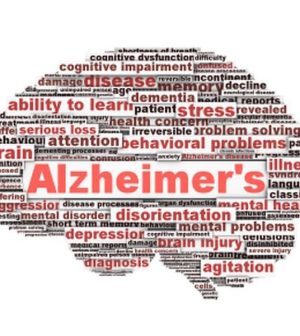- Could Your Grocery Store Meat Be Causing Recurring UTIs?
- Are You Making This Expensive Thermostat Error This Winter?
- Recognizing the Signs of Hypothyroidism
- 10 Strategies to Overcome Insomnia
- Could Artificial Sweeteners Be Aging the Brain Faster?
- Techniques for Soothing Your Nervous System
- Does the Water in Your House Smell Funny? Here’s Why
- Can a Daily Dose of Apple Cider Vinegar Actually Aid Weight Loss?
- 6 Health Beverages That Can Actually Spike Your Blood Sugar
- Treatment Options for Social Anxiety Disorder
Gene Discovery Points to a New Form of Alzheimer’s

People who carry two copies of the gene mutation most strongly implicated in Alzheimer’s disease are almost certain to develop brain changes related to the degenerative disorder, a new study says.
A single mutated APOE4 gene has been found to pose the strongest genetics-driven risk factor for late-onset Alzheimer’s, researchers said.
Virtually everyone with two copies of the APOE4 gene mutation wound up with higher levels of Alzheimer’s-related brain by age 55, compared to people with another version of APOE, researchers reported May 6 in the journal Nature Medicine.
By age 65, more than 95% of people with two APOE4 genes showed abnormal levels of amyloid protein in their cerebrospinal fluid and 75% had positive amyloid scans, researchers said. Amyloid beta plaques are one of the hallmark symptoms of Alzheimer’s.
These findings suggest that having two copies of the APOE4 gene could represent a new genetic form of Alzheimer’s disease, said Dr. Juan Fortea, director of the Memory Unit at the Sant Pau Research Institute’s Neurology Service in Barcelona, Spain.
“This gene has been known for over 30 years and it was known to be associated with a higher risk of developing Alzheimer’s disease. But now we know that virtually all individuals with this duplicated gene develop Alzheimer’s biology,” Fortea said in a news release.
“This is important because they represent between 2 and 3% of the population,” he added.
For the study, Fortea and colleagues analyzed data from nearly 3,300 brain donors, including samples from 273 people with two copies of the APOE4 gene.
The team also evaluated clinical data from more than 10,000 people with evidence of Alzheimer’s disease, including 519 people with two copies of APOE4.
“The data clearly show that having two copies of the APOE4 gene not only increases the risk, but also anticipates the onset of Alzheimer’s, reinforcing the need for specific preventive strategies,” researcher Dr. Alberto Lleó, director of the Sant Pau Research Institute’s Neurology Service, said in a news release.
Because people who test positive for two copies of APOE4 are almost certain to develop Alzheimer’s, they could be the focus of clinical trials aimed at testing targeted prevention and treatment methods, the researchers said.
More information
The Alzheimer’s Association has more on Alzheimer’s and genetics.
SOURCE: Sant Pau Research Institute, news release, May 6, 2024
Source: HealthDay
Copyright © 2026 HealthDay. All rights reserved.










